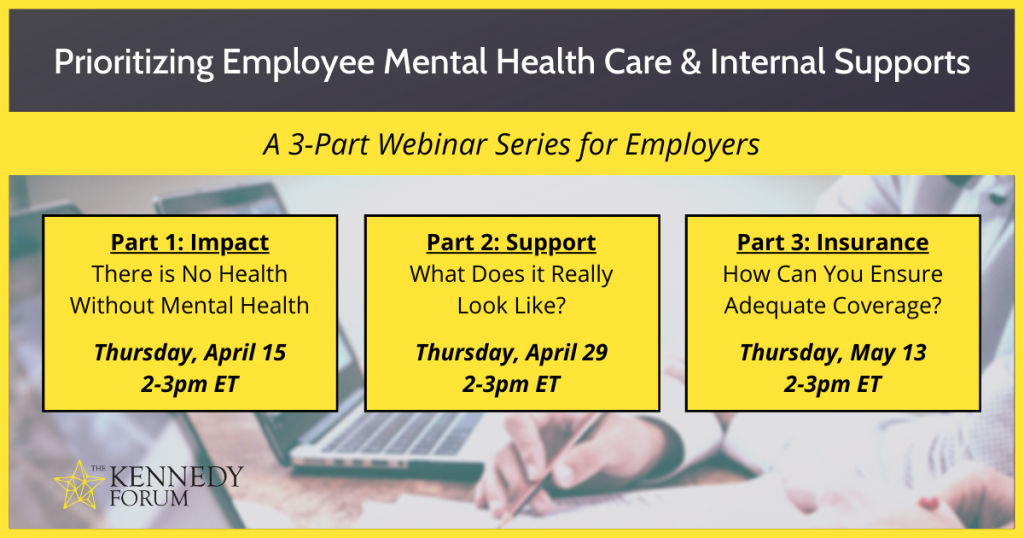In March, The Kennedy Forum announced a new webinar series for employers titled “Prioritizing Employee Mental Health Care & Internal Supports.” Participants will explore the true impact of mental health and addiction in the workplace, review pros and cons of various internal support options, and learn to collaborate with insurers to ensure better access to treatment. More below.

Announcements
The Kennedy Forum mourns the passing of Steve Winter, a true friend to mental health parity. When Patrick and others were working to pass the 2008 Mental Health Parity and Addiction Equity Act, Steve traveled at his own expense to testify at several field hearings and share his family’s experience with mental illness. Patrick described Steve’s invaluable contributions to those hearings in his 2015 book, “A Common Struggle.” Read the passage here. We send our condolences to Steve’s family and hope to honor his legacy through our dedication to advancing parity for all.

Policy Pulse
Illinois lawmakers introduced legislation (HB2595 and SB697) containing provisions of The Kennedy Forum’s Jim Ramstad Model State Legislation. By updating IL law to include clear definitions and standards regarding medical necessity, we can treat mental health and substance use disorders ‘before stage four,’ thus saving lives, reducing homelessness, and decreasing costs to the state, communities, and taxpayers. On March 26, the IL House Mental Health & Addiction Committee passed the House version of the bill, HB2595, out of committee 16-0! Read more about our model legislation here.
The Kennedy Forum endorsed legislation recently introduced by Congresswoman Katie Porter (CA-45), Congressman Tony Cárdenas (CA-29), Congresswoman Ayanna Pressley (MA-07), and Congresswoman Mary Gay Scanlon (PA-05) to reduce violence against individuals with mental illness and disabilities. The Mental Health Justice Act would help local governments fund expenses for mental health provider first responder units to respond to individuals experiencing a mental health crisis. More here.
CMS recently announced they will not move forward with the proposed changes to Medicare Part D that would have reduced the availability of critical medications in six “protected classes,” including antidepressants and antipsychotics. Had the changes moved forward, Part D plans would have been allowed to significantly narrow covered medications in these classes. This is an important victory for patients with mental health conditions! We were one of over 130 patient groups that urged Secretary Becerra to maintain key Medicare protections for patients. More here.
The Kennedy Forum thanked Congressman Norcross (NJ-01), Congressman Courtney (CT-02), Congresswoman Kuster (NH-02), and Congressman Fitzpatrick (PA-01) for reintroducing the Parity Enforcement Act. By expanding the Department of Labor’s ability to hold health insurers accountable for equal coverage of mental health and addiction care, we can save lives. Learn more here.
We also endorsed the Youth Mental Health and Suicide Prevention Act, which will support positive mental health promotion and suicide prevention programs in high schools. The bill—introduced by Congressman Tony Cárdenas (CA-29) and Congresswoman Lori Trahan (MA-3)—would authorize the Secretary of Health and Human Services to establish a grant program that provides funding to school districts to strengthen awareness through prevention efforts, public health campaign materials, and other activities. More here.
The Kennedy Forum also endorsed the TREATS Act, introduced by Senators Tina Smith (D-MN) and Lisa Murkowski (R-AK), which would eliminate the in-person exam requirement and allow care providers to prescribe certain controlled substances via telehealth in Medicated Assistant Treatment (MAT) therapy programs, as well as expand Medicare coverage for mHealth services to include audio-only phone calls. More here.
The Kennedy Forum Illinois wrote a letter in support of a lawsuit against the sheriff of DuPage County, Illinois to ensure an individual with opioid use disorder could continue to access methadone treatment while serving 30 days for an alcohol-related DUI. Methadone blocks cravings for opioids and is an effective treatment for opioid use disorder. Read a blog post about the issue here.
Campaigns & Resources

The Kennedy Forum’s latest round of Don’t Deny Me campaign posts for partner organizations addressed recent youth mental health data, Brain Awareness Week, and National Drug and Alcohol Facts Week. See sample posts here, here, and here.
The Kennedy Forum welcomes the American Association for Marriage and Family Therapy as the latest partner to join the Don’t Deny Me campaign.
Inseparable, The Kennedy Forum Illinois, and more than a dozen other organizations are helping to spearhead a new campaign called “Health is Health Illinois” that is focused on advancing mental health parity by passing HB 2595 and SB 697 in the Illinois General Assembly. More here.
Upcoming Events
A Discussion and Q&A on “Under Our Roof”
April 7, 2021Patrick and Amy Kennedy will join Congresswoman Madeleine Dean and her son Harry Cunnane for a discussion about their new book, “Under One Roof,” which addresses the impact of addiction/recovery on family.
Virtual Town Hall: Addiction & Mental Health As The Nation Moves Toward Recovery from COVID-19
April 14, 2021
The Kennedy Forum—in partnership with Discovery Institute and The Voices Project—is sponsoring a virtual town hall and discussion featuring Patrick J. Kennedy titled, “Addiction & Mental Health As The Nation Moves Toward Recovery from COVID-19” on Wednesday, April 14 at 6pm ET. Space is limited, please RSVP today.
Webinar Series: Prioritizing Employee Mental Health Care & Internal SupportsApril 15 + April 29 + May 13, 2021
We will be hosting a 3-part webinar series for employers titled, “Prioritizing Employee Mental Health Care & Internal Supports” starting April 15. Participants will explore the true impact of mental health and addiction in the workplace; review pros and cons of various internal support options; learn to collaborate with insurers to ensure better access to treatment; and much more. See full description and register here.

In the News
Patrick and John E. Sununu, co-chairs of the Bipartisan Policy Center’s Behavioral Health Integration Task Force, co-authored an op-ed for The Hill titled “Tackling America’s mental health and addiction crisis demands integrated care.” Their article outlines the Task Force’s new regulatory and legislative recommendations for primary care and behavioral health care integration in the U.S. Read it here.
The Kennedy Forum Illinois’ David Applegate spoke to The State Journal-Register about the need for making sure medical necessity determinations for mental health and substance use disorder care are consistent with generally accepted standards of care. Read the article here.
Amy Kennedy, education director of The Kennedy Forum, wrote an op-ed for MedPage Today about the urgent need to prioritize mental health in schools. Read it here.
Recordings
Patrick joined Dr. Joshua Gordon, director of the National Institute of Mental Health, Dr. Ben Miller of Well Being Trust, and Colleen Carr of the National Action Alliance for Suicide Prevention to kick off a series of critical briefings for Congressional staff to discuss urgently needed policy solutions around mental health and addiction. The event, organized by the National Action Alliance for Suicide Prevention’s Mental Health & Suicide Prevention National Response to COVID-19 (National Response) was held in cooperation with Senator Stabenow, Representative Napolitano, and Representative Katko. Watch it here.
Patrick was recently interviewed for a PJ SOLOMON podcast titled “Behavioral Health’s Defining Moment” regarding his work with One Mind, the need for integrated health, the impact of COVID, technological innovations in mental health care, and more. Listen here.
Patrick joined the Bipartisan Policy Center for the release of a new report by their Behavioral Health Integration Task Force. The Task Force, which Patrick co-chairs, put forth recommendations to address barriers to primary care and behavioral health integration through improving payment delivery, expanding and training the behavioral health workforce, and removing obstacles to telehealth and technology. Watch the event here.
